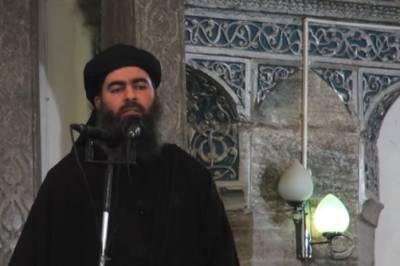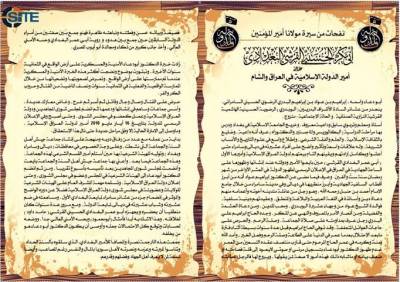A Biography of Abu Bakr al-Baghdadi

In light of the Islamic State's (IS) advances in Iraq and Syria, many have asked about the group's shadowy leader and self-proclaimed Caliph, Abu Bakr al-Baghdadi. In July 2013, users on jihadist discussion forums distributed what turned out to be a largely accurate biography of al-Baghdadi (AKA Abu Du'a, Ibrahim bin Awwad bin Ibrahim al-Badri al-Radhwi al-Husseini al-Samarrai) that may help to reveal more about such a powerful and infamous leader the world knows so little about. The unidentified author told of Baghdadi being an active jihadist for at least eight years in Iraq and having served in the Shariah Committees of both Jeish Ahl al-Sunnah wal Jama'a, a group he founded, and the Mujahideen Shura Council (MSC), IS's predecessor.
The biography, as originally translated and published by SITE Intelligence Group on July 16, 2013, follows:

Moments from the Life Journey of our Master the Emir of the Believers
Abu Bakr al-Husseini al-Qurashi al-Baghdadi
-May Allah Preserve Him-
Emir of the Islamic State in Iraq and the Levant
Abu Du'a, or Ibrahim bin Awwad bin Ibrahim al-Badri al-Radhwi al-Husseini al-Samarrai, is his name. He descended from the honorable tribes of the Badriyeen (al-Bobadri) that are Radhawiyyah, Husseiniyyah, Hashimite, Qurashiyah, Nazariyah, 'Adnaniyah. Marital status: Married.
A professor, teacher, former educator, recognized preacher, and a graduate of the Islamic University in Baghdad, where he finished his academic studies (BA, MA and PhD). He is known as a preacher and a person of knowledge in Islamic culture, Shariah knowledge, and jurisprudence, and possessing vast knowledge of history and lineage. He had extensive relationships and a clear influence on members of his tribe in Diyala and Samarra, to the extent that they declared, by their own free will and their total certainty, their pledge allegiance to the Islamic State of Iraq and its first emir, Abu Omar al-Baghdadi al-Qurashi. They pledged allegiance to the Emir and his State when it was first created and appeared on the jihadi battlefield in Iraq in the official declaration of the State in the last ten days of Ramadan 2006. Afterwards, Dr. Ibrahim Awwad was recognized as one of the most prominent figures of Salafist Jihadism and its most recognized proponent in Diyala and in the city of Samarra through the Mosque of Imam Ahmad bin Hanbal, may Allah have mercy on him.
He is a man from a religious family. His brothers and uncles include preachers and teachers in Arabic, eloquence and logic. Their religious creed is Salafist. Sheikh Awwad's mother is one of the notables of the Bobadri tribe, and loves religion, and calls for decency and goodness. She is one of the supporters of promoting virtue and prohibiting vice. His grandfather is Hajj Ibrahim Ali al-Badri, a man known for always going to pray in the mosque, caring for familial ties, and having concern for the needs of meek families. Hajj Ibrahim died a few years ago, during the time after the invasion, after he had lived long in this world with obedience, family, and doing good. Allah graced Hajj, with His grace and generosity, until Hajj almost reached the middle of his ninth decade of life.
Dr. Abu Du'a's lack of appearance in an audio or visual recording is not due to his lack of eloquence or weak arguments. The words that are said by these people are untrue, for the man's speeches were eloquent and his arguments good and his intelligence apparent. He brought together two traits from the former emirs of the State, combining the calm and vision of Abu Omar al-Baghdadi, and his high security sense, and a large part of the intelligence of Abu Ayyub al-Masri.
Abu Du'a's security and military expertise on the ground developed in the last eight years. This security and military expertise crystallized clearly and it matured when it was applied on the ground, when he was exposed to its hardships and sacrifices through practical application in the last eight and a half years of fighting and hit-and-run strikes.
He incited for fighting and roamed and fought. He was captured and escaped. He waged several battles, and formed groups and contributed in founding them and supporting them. He joined the Mujahideen Shura Council and the Islamic State of Iraq. He worked as a member in the Shura Council, until the official declaration of the State on 16 May 2012, naming him the Emir of the Islamic State of Iraq. He attained the current emirate-hood only through going through several phases.
Beginning with his work with several of his companions, he founded the group of Jeish Ahl al-Sunnah wal Jama'a, which was active in particular in Diyala, Samarra, and Baghdad. He took over the Shariah Committee in it when the emir of the Shariah Committee took the leadership position of the group. Afterwards, this group, Jeish Ahl al-Sunnah wal Jama'a, pledged allegiance and joined the Mujahideen Shura Council nearly a week after it was founded. Abu Du'a' joined the Council's Shariah Committee and served as a member of the Shura Council, until the declaration of the Islamic State of Iraq. Then, he assumed the position of general supervisor of the State's Shariah Committee and became a member in the State's Shura Council, not to mention his clear and influential role in bringing in some of the tribes of Samarra to pledge allegiance to the first Baghdadi, and his contribution in bringing his tribe and its youth in Diyala to pledge allegiance to the State. With the passing of several years, it was logical for Abu Omar al-Baghdadi al-Husseini al-Qurashi (Hamid Daoud) to bring him in to be his successor, and there is no doubt in this at all for the likes of Abu Mahmoud, with his high security sense, and his taking into account all that happens and expecting all the possibilities, made him recommend that Dr. Abu Du'a be the one to succeed him.
This biography was compiled in support and fairness to Emir al-Baghdadi, who was slandered with tongues of iron that pretended to forget his passion and determination and his support to the people of Syria with money and soul despite the difficulties. It is also an example for those who do not know the people of jihad and their goodness and capability.